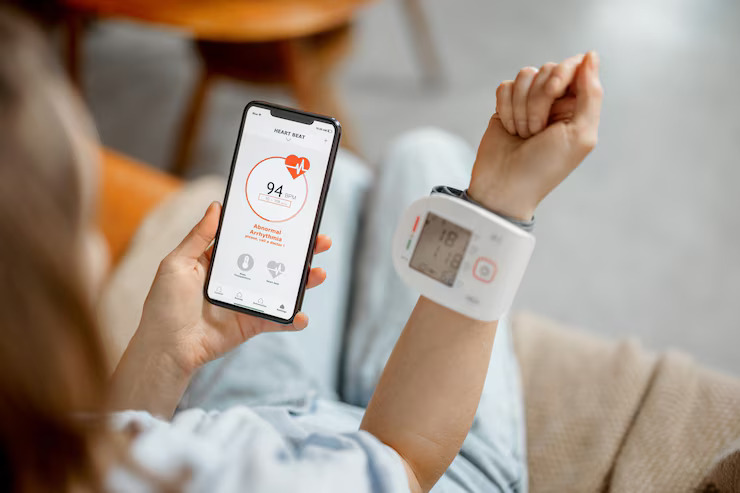The Role of Wearable Technology in Pre-Symptomatic Disease Detection
In today’s digital era, data is a crucial resource, transforming healthcare by enabling early disease detection. Wearable technology, through the capture and analysis of digital biomarkers, offers a powerful tool for predicting and preventing illnesses before symptoms arise. By continuously monitoring vital signs, these devices empower both individuals and healthcare providers to make proactive, data-driven decisions.
The ability of wearables to detect subtle physiological changes before traditional symptoms appear presents a major advancement in personalized healthcare. This article explores the potential of wearable sensors in pre-symptomatic disease detection, addressing key themes, opportunities, and challenges. With insights backed by statistics and research from trusted sources, it highlights how these innovations could revolutionize preventive medicine and clinical care.
As wearable technology evolves, its integration into mainstream healthcare could significantly enhance early intervention, reducing the burden of chronic diseases and improving patient outcomes.
The Significance of Wearable Technology in Healthcare
Wearable technology is rapidly advancing in digital health, enabling individuals to track and monitor various physiological parameters in real time. Equipped with sophisticated sensors and connectivity features, these devices have revolutionized health data collection and utilization, shifting the focus from treatment to prevention.
As healthcare costs continue to rise, the integration of digital biomarkers in wearables offers a proactive approach to disease management. By continuously monitoring vital signs, these devices facilitate early detection and timely intervention, reducing the risk of complications and improving patient outcomes.
Beyond personal health tracking, wearable technology plays a crucial role in remote patient monitoring and clinical research, enhancing data accuracy and accessibility. With real-time insights, healthcare providers can make informed decisions, optimizing care while reducing overall healthcare expenditures. As this technology evolves, its potential to reshape preventive medicine and personalized healthcare continues to grow.
Understanding Digital Biomarkers
Digital biomarkers are quantifiable physiological and behavioral data collected through digital devices, offering a significant evolution from traditional biomarkers. Unlike conventional methods, they provide continuous, real-time insights, enhancing early disease detection and personalized healthcare.
Key Aspects of Digital Biomarkers
- Comprehensive Health Monitoring – Wearable sensors track vital metrics such as heart rate variability, sleep patterns, and gait analysis, serving as non-invasive diagnostic tools.
- Early Disease Detection – By identifying subtle physiological changes before symptoms appear, digital biomarkers support timely interventions and preventive care.
- Patient-Centric Insights – A landmark study found that over 70% of individuals prefer data-driven insights for managing chronic conditions, highlighting the growing reliance on wearable technology in healthcare.
- Enhanced Clinical Decision-Making – Continuous monitoring enables healthcare providers to make informed, proactive decisions, optimizing patient outcomes.
As wearable technology advances, digital biomarkers are poised to revolutionize healthcare by bridging the gap between real-time monitoring and preventive medicine.
The Role of Wearable Sensors
Wearable sensors play a crucial role in collecting digital biomarkers, enabling continuous health monitoring and real-time data analysis. These sensors capture a wide range of physiological and behavioral data, which are then processed by advanced algorithms to assess health risks and detect early signs of diseases.
Key Factors Driving Wearable Sensor Adoption
- Integration in Clinical Trials – Over 50% of recent clinical trials have incorporated wearable sensors, showcasing their growing acceptance in regulated research environments. Their ability to provide objective, real-world data enhances the accuracy and reliability of clinical studies.
- Advancements in Technology – Innovations in miniaturization and battery efficiency have significantly improved wearable comfort, longevity, and performance, making them more practical for long-term health tracking.
- Enhanced Health Monitoring – By offering non-invasive, continuous data collection, wearable sensors contribute to early disease detection, chronic condition management, and preventive healthcare.
As wearable technology continues to evolve, its role in clinical research, patient monitoring, and personalized healthcare is expected to expand, revolutionizing modern medicine.

How Wearables Predict Health Risks
Wearable technology is revolutionizing healthcare by predicting health risks through pattern recognition and data analysis. These devices continuously monitor physiological parameters, detecting subtle deviations that may indicate potential health issues before symptoms manifest. By leveraging real-time insights, wearables enable proactive interventions and improved disease management.
How Wearables Predict Health Risks
- Early Detection of Health Conditions – Subtle changes in sleep quality, heart rate variability, and activity levels can signal early signs of conditions like sleep apnea, cardiovascular irregularities, and metabolic disorders.
- Algorithm-Driven Analysis – Advanced AI-powered algorithms refine raw sensor data, identifying patterns that might otherwise go unnoticed. These insights provide physicians with a data-driven foundation for accurate prognoses and personalized treatment plans.
- Improved Predictive Accuracy – According to industry reports, wearable technology now boasts predictive accuracy rates exceeding 85%, demonstrating significant advancements in reliability and effectiveness.
- Empowering Preventive Healthcare – By offering continuous health monitoring, wearables shift the focus from reactive treatment to proactive prevention, ultimately reducing healthcare costs and improving patient outcomes.
As wearables continue to evolve, their integration into mainstream healthcare will further enhance precision medicine, remote monitoring, and early disease intervention, shaping the future of digital health.
Key Diseases for Early Detection
Wearable technology is transforming healthcare by enabling early detection of chronic diseases through continuous monitoring of digital biomarkers. Conditions such as heart disease, diabetes, and neurological disorders are prime candidates for wearable-based monitoring due to their reliance on physiological and behavioral patterns. These devices provide real-time insights, allowing for timely interventions that can prevent complications and improve patient outcomes.
Key Applications of Wearables in Disease Detection
- Cardiovascular Health Monitoring – Wearables track heart rate variability, blood pressure, and ECG patterns, helping detect early signs of arrhythmias, hypertension, and heart disease. Organizations like the American Heart Association actively promote the use of wearable data for cardiovascular risk management.
- Diabetes Management – Continuous glucose monitors (CGMs) in wearables help individuals with diabetes or prediabetes by tracking blood sugar fluctuations and preventing severe complications.
- Neurological Disorder Detection – Wearables can assess movement patterns and cognitive function, aiding in the early diagnosis of Parkinson’s disease, epilepsy, and other neurological conditions.
Comparison of Wearables in Disease Detection
Condition | Key Metrics Monitored | Wearable Benefit |
|---|---|---|
Heart Disease | Heart rate, ECG, Blood Pressure | Early detection of arrhythmias, hypertension |
Diabetes | Glucose levels, physical activity | Continuous blood sugar monitoring, risk prevention |
Neurological Disorders | Motor function patterns, sleep cycles | Early detection of Parkinson’s, epilepsy |
As wearable technology advances, its role in preventive healthcare and chronic disease management will continue to grow, fostering a proactive approach to patient well-being.
Challenges in Deploying Digital Biomarkers
Digital biomarkers hold immense potential in health monitoring and disease prevention, but their widespread adoption comes with significant challenges. Issues such as data privacy, device consistency, and clinical validation must be addressed to ensure their effectiveness and reliability in healthcare settings.
Key Challenges in Digital Biomarker Deployment
- Data Privacy and Security – With wearables continuously collecting sensitive health data, ensuring robust encryption and compliance with privacy regulations is essential. Reports indicate that 30% of users express concerns over data security, emphasizing the need for transparent data-handling policies.
- Variability in Sensor Quality – Differences in hardware, sensor calibration, and data accuracy across manufacturers can lead to inconsistencies, impacting the reliability of digital biomarkers. Standardized benchmarking protocols are needed to ensure uniform performance.
- Clinical Validation and Regulatory Compliance – For digital biomarkers to gain medical credibility, they must undergo rigorous clinical trials and obtain regulatory approvals from bodies like the FDA and EMA.
- Balancing User Autonomy and Medical Oversight – While wearables empower individuals to track their health, healthcare providers must interpret and validate this data to avoid misdiagnosis and misinformation. A flexible yet stringent regulatory framework is needed to support both self-monitoring and professional healthcare integration.
Addressing these challenges will be crucial in establishing digital biomarkers as a trusted tool in modern healthcare.

Opportunities in the Wearable Industry
The wearable technology industry is on the cusp of significant expansion, driven by growing consumer demand for personalized health insights and continuous monitoring. Advances in Artificial Intelligence (AI) and Machine Learning (ML) are improving the accuracy and reliability of predictive health models, paving the way for new applications and innovations.
Key Opportunities in the Wearables Industry
- AI-Powered Health Analytics – AI and ML are enhancing predictive modeling, allowing wearables to provide early warnings for diseases, real-time health assessments, and personalized recommendations.
- Growth in Health-Focused Wearables – The rising awareness of preventive healthcare and chronic disease management is increasing demand for smartwatches, fitness trackers, and medical-grade wearables.
- Market Expansion and Investment Potential – With an expected 25% industry growth by 2025, businesses and investors have opportunities to develop next-generation wearable solutions and expand into emerging markets.
- Integration with Remote Healthcare – Wearables are playing a crucial role in telemedicine and decentralized clinical trials, making healthcare more accessible, cost-effective, and data-driven.
As the industry evolves, wearables will continue to bridge the gap between technology and healthcare, fostering a future of smarter, more proactive health management.
Advancements and Future of Wearable Technology
The continuous evolution of wearable technology is driving greater adoption and effectiveness in health monitoring and disease prevention. Innovations in biosensors, energy harvesting, and secure data networks are addressing limitations, leading to improved accuracy, battery efficiency, and seamless integration into healthcare ecosystems. The surge in patents and intellectual property filings highlights ongoing breakthroughs, further refining sensor performance and longevity.
Key Technological Advancements
- Improved Battery Life – Enables 50% longer device usage, enhancing user experience.
- Enhanced Biosensors – Increases data accuracy and reliability, making health monitoring more effective.
Future of Wearables in Healthcare
Wearables are becoming more intuitive, accessible, and affordable, democratizing health data and enabling personalized medicine and telehealth innovations. As integration within healthcare systems deepens, real-time monitoring and preventive care will become mainstream.
Regulatory and Ethical Considerations
With the rise of digital health, ensuring ethical data usage, transparency in algorithms, and clear data ownership policies is crucial. Collaborative efforts among governments, tech firms, and healthcare providers are essential to establish responsible regulations that protect consumers while fostering innovation.
Conclusion
The advancement of wearable technology and digital biomarkers is reshaping healthcare by enabling a proactive approach to disease prevention and management. While challenges such as data privacy, clinical validation, and seamless integration remain, the growing precision of wearables highlights their increasing role in personalized healthcare.
As innovations in AI-driven analytics, sensor accuracy, and regulatory frameworks continue to evolve, wearables will become even more reliable, fostering a future of predictive, patient-centric care. With ongoing research and industry collaboration, these technologies will bridge the gap between early detection and effective intervention, making healthcare more accessible and data-driven.
To explore how wearables and digital health solutions are transforming clinical research and patient monitoring, visit Delve Health for insights into the latest advancements in decentralized trials and remote health monitoring.
Frequently Asked Questions
What are digital biomarkers, and how are they beneficial?
Digital biomarkers are data points collected via digital devices, offering real-time, continuous health monitoring. They revolutionize healthcare by enabling earlier disease detection and personalized disease management. Their non-invasiveness and the ability to provide insights beyond traditional clinical settings make them invaluable for preventive health strategies, particularly for managing chronic conditions.
How do wearable sensors contribute to early disease detection?
Wearable sensors collect diverse data like heart rate, physical activity, and sleep patterns, enabling analysis of physiological changes over time. Algorithms process this data to identify patterns indicative of potential health risks. This proactive approach facilitates early intervention and enhances health outcomes, marking a shift towards preventive healthcare.
What challenges do wearables face in capturing reliable digital biomarkers?
Key challenges include data inconsistency, device reliability, and data privacy concerns. Variability in sensor quality can impact data accuracy, while concerns around privacy necessitate stringent regulations. Continuous technological advancements aim to address these issues through improved sensor technology, standardized data protocols, and secure data transmission frameworks.
Which diseases are best detected early using wearable technology?
Wearables are particularly effective in monitoring and detecting early signs of cardiovascular diseases, diabetes, and sleep disorders. By analyzing metrics such as heart rate variability and glucose levels, these devices support the timely identification and management of chronic diseases, enhancing preventive and personalized healthcare strategies.
What is the future of wearable technology in healthcare?
The future of wearable technology lies in further miniaturization, improved predictive analytics, and increased integration into health systems. As advancements continue, wearables are expected to revolutionize patient care by supporting personalized medicine and facilitating remote health monitoring, ultimately leading to a more efficient, individualized approach to health and wellness.
For more information and insights on digital biomarkers and wearable technology, visit DelveHealth.













